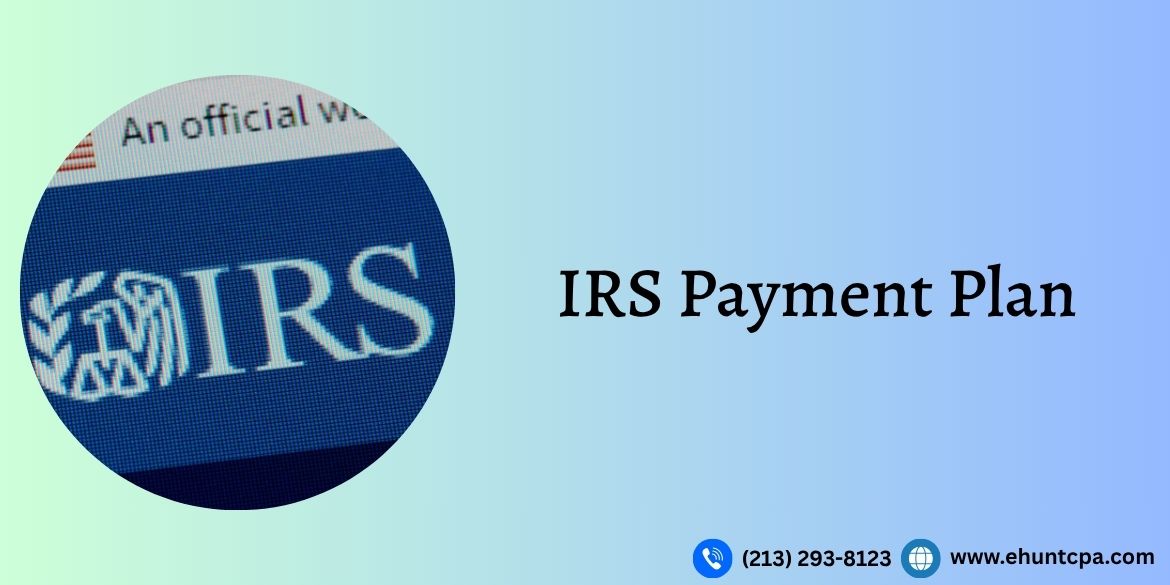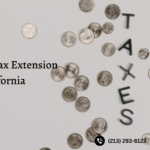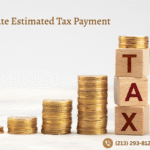
Are you a taxpayer but worried about paying the full amount upfront? It’s obvious to panic in this situation, but the solution is an IRS Payment Plan. Paying taxes in one go can be worrisome for most individuals, so these installment agreements allow the taxpayers to break down their tax amount into monthly payments that are easy to manage, reduce stress, and help them avoid penalties and aggressive collection actions.
Whether you are a business or an individual taxpayer struggling to pay the stressful federal taxes, the IRS Payment Plan offers a range of payment plans with manageable terms and conditions depending on your specific financial condition.
This guide offers you complete insight into the IRS Payment Plan, how it is helpful for taxpayers, how to set up a payment plan with the IRS, eligibility, and how professional guidance from Eric M Hunt, CPA, can streamline the entire process.
What is an IRS Payment Plan?
An IRD Payment Plan or Installment Agreement is a formal agreement between an individual or a business that relieves you from paying your tax debt and allows you to pay it over time. This agreement will enable taxpayers to make monthly payments until the debt is completely resolved instead of facing stressful penalties, bank levies, or garnishments.
You can choose from various IRS payment plans depending on the amount you owe and your current financial condition. Each plan has its eligibility criteria, fees, and terms and conditions. Determining and picking the best-fit plan for your financial situation is crucial.
Some common payment arrangements are:
- Short-term payment plans (can be paid in 120 days or less)
- Long-term payment plans (can be paid over 120 days)
- Guaranteed Installment Agreements
- Streamlined Installment Agreements
- Partial Payment Installment Agreements
Why an IRS Payment Plan?
An IRS Payment Plan is helpful if you can’t pay your complete tax liability immediately, as it allows you to pay it over time.
Considering an IRS Payment Plan helps you:
- Avoid inflated penalties and interest
- Avert collection actions like wage garnishment or property liens
- Maintain good standing with the IRS
- Plan a manageable monthly budget
- Uphold your credit by showing hands-on effort to pay
Creating a payment plan for your debt reflects your responsible behavior to the IRS, making them more likely to work with you.
IRS Payment Plan Options Depending on the amount of Your Debt
Considering the amount you owe, the IRS presents different payment plans with different timelines and terms:
1. $10,000 or Less – Guaranteed Installment Agreement
If you owe $10,000 or less, you’re eligible for a Guaranteed Installment Agreement without a comprehensive financial disclosure, and the necessities are:
- Paying off your debt within 36 months
- Acquiescence with all tax filings
- Should not have had another installment plan in the past 5 years
2. $50,000 or Less – Rationalized Installment Agreement
If you owe $50,000 or less, the IRS offers a Streamlined Installment Agreement that doesn’t require financial documentation. This plan allows for a 72-month repayment period; however, you must be willing to make automatic monthly payments.
3. More than $50,000 – With Financial Review
If your tax debt exceeds $50,000, you must submit a comprehensive financial statement (Form 433-A or 433-F). The IRS will analyse your assets, income, and expenses to recognise a reasonable monthly amount. These plans can be extended up to 84 months; however, they require thorough documentation and often negotiation.
How to Set Up a Payment Plan With the IRS
Here are the simple steps to set up a payment plan with the IRS:
- Evaluate What You Owe: Visit the IRS website or review your IRS notice to know your total balance, including interest and penalties.
- Pick a Suitable Plan: Choose a plan depending on your debt amount and ability to repay it. If you owe less than $50,000, use the IRS’s Online Payment Agreement Tool.
- Apply Online or Via Mail: You can apply for a payment plan through various modes, including:
-
- Online (quick and easiest)
- By phone (IRS: 800-829-1040)
- By submitting Form 9465 (Installment Agreement Request)
- Set Up Automatic Payments: Hassle-free and easy to manage, monthly payments can be made via:
-
- Direct bank account debit
- Payroll deduction
- Online payment (Direct Pay or EFTPS)
- Check or money order (least preferred option)
- Maintain Acquiesce: Once enrolled, ensure you file all future tax returns on time and do not skip the monthly payments to avoid evasion of your agreement.
Fees and Penalties Associated With IRS Payment Plans
Although IRS payment plans are beneficial in removing financial burdens, they aren’t free. Check out the associated fees and penalties that you should be aware of:
| Type of Plan | Setup Fee (Online) | Setup Fee (Paper/Phone) | Monthly Penalty & Interest |
| Direct Debit Installment Plan | $31 | $107 | Yes |
| Non-direct Debit Plan | $130 | $225 | Yes |
| Low-Income Applicants | $0–$43 | $0–$43 | Yes |
Interest accumulates on the unpaid balance until you resolve the complete amount.
Professional Guidance From Eric M Hunt
Even if you can easily set up a basic plan, complex situations involving over $50,000 in debt, previous defaults, and lien notices require professional help. At Eric M. Hunt, CPA, we are focused on minimizing your tax-related stress and helping you move forward financially. We deliver specialized tax resolution services, allowing you to:
- Evaluate the best IRS payment plan for your financial well-being
- Negotiate terms and conditions with the IRS on your behalf
- Submit precise financial disclosures
- Stay acquiescent to avoid IRS-related concerns in the future
How to Set Up an IRS Payment Plan That Works for You
Knowing how to set up an IRS payment plan is just the beginning. The key to financial success is picking the right plan and staying committed. An appropriately structured plan can contribute to missed payments, fees, and even default.
Here are a few tips to ensure the success of an IRS Payment Plan:
- Be practical about what you can afford monthly
- Automate your payments to avoid delays and missing deadlines
- In case your financial situation changes, communicate with the IRS
- Prefer merging your tax years into one agreement
- Monitor your progress by reviewing your IRS account annually
Frequently Asked Questions
1. Can I file for a payment plan with the IRS if I’m already in collections?
Yes, you can file an IRS Payment Plan even if you are already in collections; however, the process may require additional documentation and take longer than usual.
2. How long does it take for the IRS to approve a payment plan?
Generally, the online applications are approved instantly if you meet the basic criteria, while mail or phone requests usually take several weeks.
3. What happens if I miss a payment?
Missing a payment results in default, causing penalties or enforcement actions like levies or liens.
4. Does setting up an IRS payment plan prevent interest and penalties?
An IRS payment plan saves you from strict enforcement; however, the interest and late payment penalties continue until your full balance is resolved.
5. Can a CPA help me reduce my monthly payment?
At Eric M Hunt, CPA, our knowledgeable and experienced CPA negotiates with the IRS on your behalf and proposes an amount you can easily pay monthly.
Final Thoughts
An IRS Payment Plan offers a practical way to manage and resolve tax debt, relieving financial stress. Whether you owe a small or large amount, the IRS provides various options to fit your particular situation and amount. However, navigating the IRS system can be confusing for some, especially if significant debt or multiple tax years are involved.
That’s where you need professional guidance from Eric M Hunt. Professionals can make a real difference in your situation. From understanding your financial condition to picking the right plan, negotiating terms and amounts with the IRS, and submitting clear and precise documentation, a CPA covers it all, helping you at every step.
Struggling with tax payments? Don’t wait for penalties to pile up and IRS collections. Collaborate with Eric M Hunt, CPA, to find the best solutions for your tax situation. Take control of your financial future with IRS Payment Plan solutions.






